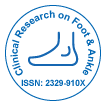Diabetes Mellitus Patients on Chronic Care Follow-Up in Southern Hospitals about Diabetic Foot Ulcer Management and Related Factors
Received Date: Oct 15, 2022 / Published Date: Oct 31, 2022
Abstract
Diabetes patients who have diabetic foot ulcers (DFU) have full-thickness wounds below the ankle that penetrate the dermis. Due to the rising prevalence of diabetes mellitus (DM) worldwide and the lack of awareness and practise of diabetic foot self-care, there has been an increase in the incidence of diabetic foot ulcers. As a result, the study's objective was to evaluate patients with diabetes mellitus in southern Ethiopian hospitals' knowledge of and attitudes toward diabetic foot ulcers and related factors. The investigation was carried out using a multicenter cross-sectional design. At Bedele General Hospital and Mettu Karl Comprehensive Specialized Hospital, all diabetes patients who met the study's inclusion criteria and were receiving outpatient care between August 9, 2021, and September 5, 2021 G were questioned using a semi-structured questionnaire. A social science statistical analysis tool was used to analyse the data. Most of the study participants had positive attitudes, while more than half had weak knowledge. Knowledge was highly correlated with age and educational attainment. The following factors were found to be predictive of attitudes toward diabetic foot care: monthly income, educational attainment, prior knowledge, and prior foot ulcer history. Therefore, diabetic foot care education should be offered by healthcare professionals to prevent additional foot ulcer issues. In addition, patients with poor socioeconomic level who have developed diabetic foot ulcers should receive extra care.
Citation: Shivam P (2022) Diabetes Mellitus Patients on Chronic Care Follow-Up in Southern Hospitals about Diabetic Foot Ulcer Management and Related Factors. Clin Res Foot Ankle, 10: 372.
Copyright: © 2022 Shivam P. This is an open-access article distributed under the terms of the Creative Commons Attribution License, which permits unrestricted use, distribution, and reproduction in any medium, provided the original author and source are credited.
Share This Article
Recommended Journals
Open Access Journals
Article Usage
- Total views: 1134
- [From(publication date): 0-2022 - Apr 07, 2025]
- Breakdown by view type
- HTML page views: 795
- PDF downloads: 339
